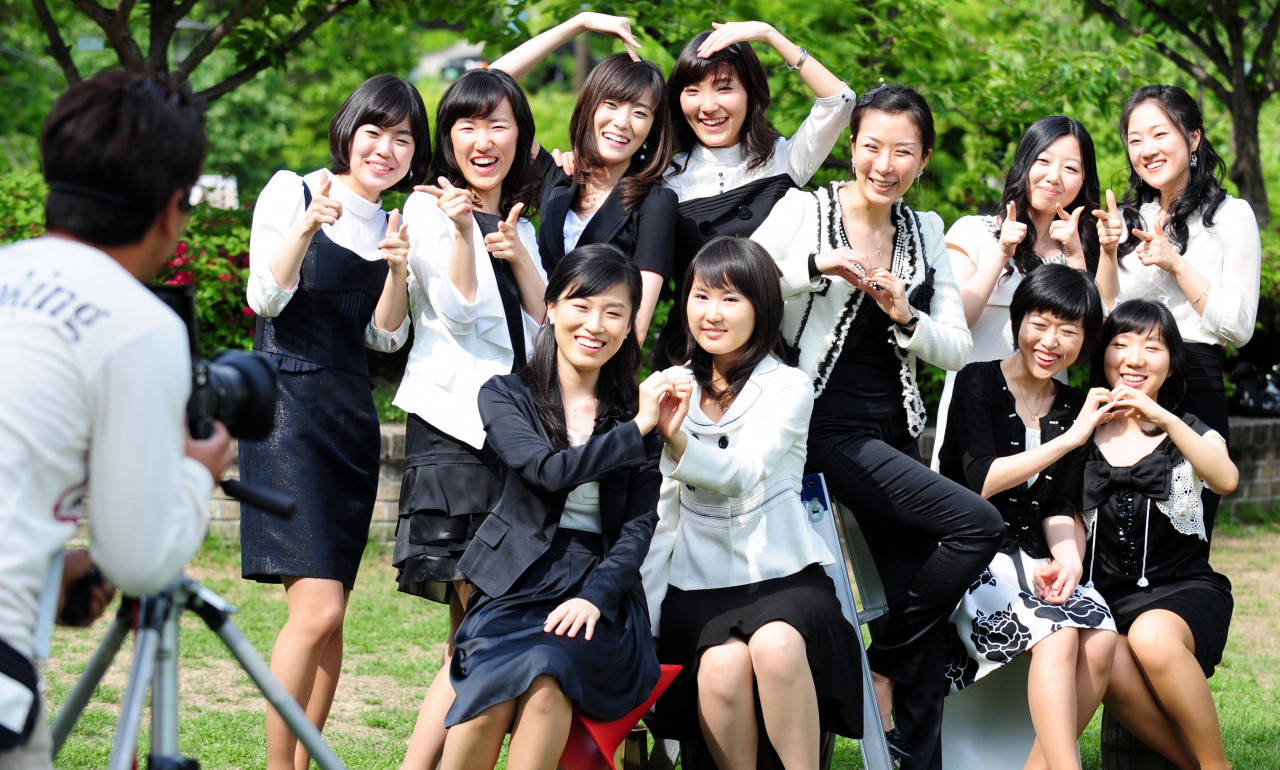 |
Amid the vibrant May greenery, female students laugh and pose for their graduation album photos, adding a refreshing energy to the campus. (Korea Herald) |
Yearbooks have long been cherished as a way to remember the school days, friendships and experiences that shape our youth.
However, in South Korea, people are now questioning whether the tradition of creating photo albums featuring all students and faculty should continue.
This shift in sentiment comes after an increase in deepfake pornography, where photographs of classmates have been illegally used to create sexually explicit content using artificial intelligence technology.
While some are calling for a halt to making yearbooks to protect students and staff, others argue that scrapping them entirely is too extreme. Yearbooks are cherished keepsakes that allow graduates to revisit their past whenever they wish.
The Korea Herald turned to Instagram to gauge our readers' thoughts on the issue, asking, “Should schools keep making yearbooks?” The results were clear: 1,186 respondents, or 78 percent, advocated for preserving yearbooks, while 344, or 22 percent, felt that the potential risks outweighed the benefits, and that schools should stop making them.
Banning albums solves nothing
Many respondents argued that banning yearbooks would not tackle the real issue.
Instagram user @colinegri pointed out, “Not having these albums won’t prevent anything related to fake images. They are not the problem.” Echoing this comment, user @danapaige08 said that, “There are way more pictures of people online. Getting rid of this (practice of making yearbooks) does not solve the problem."
This sentiment was shared by @sian.cj and @sunrose, who argued that social media platforms already have countless images on them that could be misused.
User @heesoee2 added a nostalgic perspective, saying, “We should continue (making yearbooks). It’s still a big part of our childhood that helps us keep good memories.”
Park Ju-young, 29, who graduated from college four years ago, is in favor of making school yearbooks.
"Some students may face restrictions on carrying electronic devices, which makes the unique value of a yearbook stand out. It can also capture students’ expressions and the classroom atmosphere through official photos rather than personal cameras," she explained.
"Unlike digital files, printed photos offer a sense of analog nostalgia and, when well-preserved, can last even longer than digital images," she pointed out.
Times have changed
On the other side of the debate, a some respondents felt that protecting students should take precedence.
“It is better to protect students than to have any reasons for sexual exploitation,” wrote @ishroon, aligning with the view that eliminating yearbooks could reduce risks.
User @fercho_chevez pointed to the lack of systematic measures to protect women from becoming victims of deepfake pornography, “There is no option due to the lack of protection for women in general. Lots of laws must change.”
Some noted that in this era of phone cameras and social media, memories can be stored in media other than physical photo albums, and for this reason there is much less need to make yearbooks.
User @empressg1973 said, “I have looked at my high school yearbook exactly five times in the 34 years since I graduated high school.”
Kim Eun-hye, 33, an elementary school teacher, said, "As smartphone cameras improve and taking photos in daily life has become commonplace, students frequently capture many moments with friends. As a result, the significance of the school yearbook seems to be diminishing."
"With the widespread use of various social media platforms, staying in touch with classmates and regularly updating each other on one's daily life has become easy. This connectivity further reduces the necessity of the school yearbook," Kim said.
Yoo Sun-ah, who is mother to an 11-year-old daughter, said, "I dislike having my portrait photo shown to an unspecified audience without my consent, as it feels like an invasion of privacy. There’s a chance that people I don’t know might see the yearbook, and I’m uncomfortable with my information being shared with strangers."







